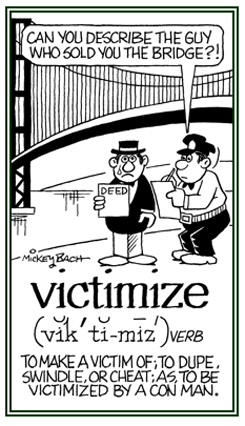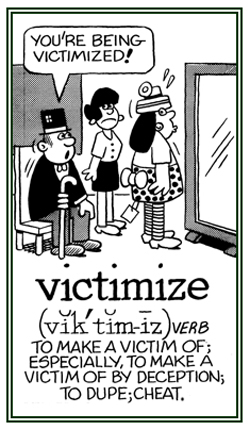victim-
(Latin: victima, an animal or a human that is offered as a sacrifice to a god; perhaps a religiously consecrated creature)
Anyone who has been tricked, swindled, robbed, or harmed by another person: "A crime victim is someone who is identified as being a person who has suffered as a result of a perpetrator; such as, a robber, a counterfeiter, a physical attacker, etc."
1. An unfortunate person who suffers from some adverse circumstance.
2. Someone who is hurt, or killed, by another person or something; especially, in a crime, accident, or disaster; such as, a murder victim.
3. Someone who is adversely affected by an action, or circumstance, whether by a human or as a result of some natural cause.
4. Anyone who is tricked or exploited.
5. A live human, or animal, used as a sacrifice or in a religious rite.
6. Etymology: "a living creature killed and offered as a sacrifice to a deity or supernatural power"; borrowed from Middle French victime, and directly from Latin victima, "person" or "animal killed as a sacrifice", or "any sacrifice".
2. Someone who is hurt, or killed, by another person or something; especially, in a crime, accident, or disaster; such as, a murder victim.
3. Someone who is adversely affected by an action, or circumstance, whether by a human or as a result of some natural cause.
4. Anyone who is tricked or exploited.
5. A live human, or animal, used as a sacrifice or in a religious rite.
6. Etymology: "a living creature killed and offered as a sacrifice to a deity or supernatural power"; borrowed from Middle French victime, and directly from Latin victima, "person" or "animal killed as a sacrifice", or "any sacrifice".
It might be distantly connected to Old English wig, "idol" with the notion of "a consecrated animal".
The meaning of "a person who is hurt, tortured, or killed by someone" is first recorded in 1660; while the meaning of "a person oppressed by some power or situation" is from 1718. The weaker sense of "a person taken advantage of" is recorded from 1781.
The provision of advice and counseling to victims of crime.
victimizable (adjective), more victimizable, most victimizable
1. A reference to a person who can be defrauded, swindled, or made into a dupe and cheated: The new boy at school seemed to be victimizable because he was taken advantage of and tricked by the big, strong, and mean boys in his class.
2. A descriptive term referring to someone who can be injured or killed: The family traveling by car in the heavy snowstorm was in great danger and victimizable due to driving off the road and crashing into a tree.
2. A descriptive term referring to someone who can be injured or killed: The family traveling by car in the heavy snowstorm was in great danger and victimizable due to driving off the road and crashing into a tree.
1. Adversity resulting from being made a victim.
2. An act that exploits or victimizes someone or which treats that person unfairly.
3. An unwarranted singling out of an individual, or group, for subjection to crime, exploitation, tort, unfair treatment, or other wrong doing.
2. An act that exploits or victimizes someone or which treats that person unfairly.
3. An unwarranted singling out of an individual, or group, for subjection to crime, exploitation, tort, unfair treatment, or other wrong doing.
victimize (verb), victimizes; victimized; victimizing
1. To subject someone to a swindle or to a fraud: Some guy on the internet was victimizing a young woman by convincing her that she was the winner of a great deal of money if she would give him her personal bank identification information.
2. To single a person out unfairly for punishment or for ill treatment: Three teenage boys victimized a woman by demanding that she give them the money that she had in her purse and when she refused, they knocked her down and ran off with her purse.

© ALL rights are reserved.

© ALL rights are reserved.
Go to this Word A Day Revisited Index
2. To single a person out unfairly for punishment or for ill treatment: Three teenage boys victimized a woman by demanding that she give them the money that she had in her purse and when she refused, they knocked her down and ran off with her purse.


Go to this Word A Day Revisited Index
so you can see more of Mickey Bach's cartoons.
A person who punishes someone unjustly or who deprives a person of something by deceit.
victimless (adjective)
1. Lacking an injured individual; such as, certain crimes.
2. A reference to a crime in which there is no injured party; for example, there are people who believe that gambling and prostitution are victimless crimes: "In a victimless crime, no one suffers directly, sometimes because the people affected by the crime have agreed to take part in it."
2. A reference to a crime in which there is no injured party; for example, there are people who believe that gambling and prostitution are victimless crimes: "In a victimless crime, no one suffers directly, sometimes because the people affected by the crime have agreed to take part in it."
The study of people who experience criminal acts and who feel helpless to improve their situations: "Several victimologies are investigating the reasons why some people are more prone to be victims of criminal acts than others."
<img src="/img/left_arrow_sm.gif" alt="" /> <img src="/img/right_arrow_sm.gif" alt="" />
Showing 1 page of 11 main-word entries or main-word-entry groups.
